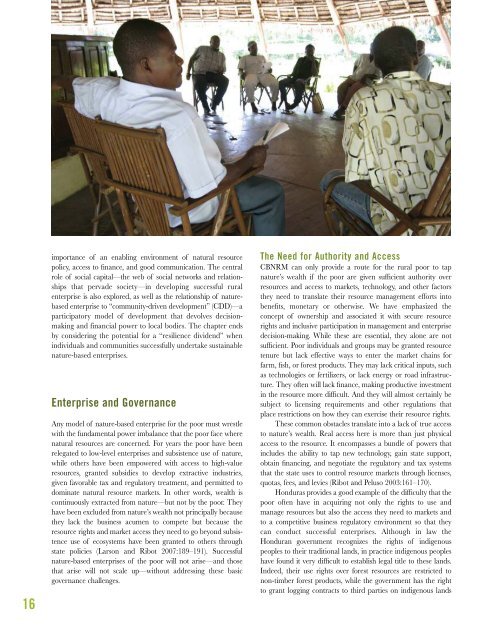Growing the Wealth of the Poor - World Resources Institute
Growing the Wealth of the Poor - World Resources Institute
Growing the Wealth of the Poor - World Resources Institute
Create successful ePaper yourself
Turn your PDF publications into a flip-book with our unique Google optimized e-Paper software.
16importance <strong>of</strong> an enabling environment <strong>of</strong> natural resourcepolicy, access to finance, and good communication. The centralrole <strong>of</strong> social capital—<strong>the</strong> web <strong>of</strong> social networks and relationshipsthat pervade society—in developing successful ruralenterprise is also explored, as well as <strong>the</strong> relationship <strong>of</strong> naturebasedenterprise to “community-driven development” (CDD)—aparticipatory model <strong>of</strong> development that devolves decisionmakingand financial power to local bodies. The chapter endsby considering <strong>the</strong> potential for a “resilience dividend” whenindividuals and communities successfully undertake sustainablenature-based enterprises.Enterprise and GovernanceAny model <strong>of</strong> nature-based enterprise for <strong>the</strong> poor must wrestlewith <strong>the</strong> fundamental power imbalance that <strong>the</strong> poor face wherenatural resources are concerned. For years <strong>the</strong> poor have beenrelegated to low-level enterprises and subsistence use <strong>of</strong> nature,while o<strong>the</strong>rs have been empowered with access to high-valueresources, granted subsidies to develop extractive industries,given favorable tax and regulatory treatment, and permitted todominate natural resource markets. In o<strong>the</strong>r words, wealth iscontinuously extracted from nature—but not by <strong>the</strong> poor. Theyhave been excluded from nature’s wealth not principally because<strong>the</strong>y lack <strong>the</strong> business acumen to compete but because <strong>the</strong>resource rights and market access <strong>the</strong>y need to go beyond subsistenceuse <strong>of</strong> ecosystems have been granted to o<strong>the</strong>rs throughstate policies (Larson and Ribot 2007:189–191). Successfulnature-based enterprises <strong>of</strong> <strong>the</strong> poor will not arise—and thosethat arise will not scale up—without addressing <strong>the</strong>se basicgovernance challenges.The Need for Authority and AccessCBNRM can only provide a route for <strong>the</strong> rural poor to tapnature’s wealth if <strong>the</strong> poor are given sufficient authority overresources and access to markets, technology, and o<strong>the</strong>r factors<strong>the</strong>y need to translate <strong>the</strong>ir resource management efforts intobenefits, monetary or o<strong>the</strong>rwise. We have emphasized <strong>the</strong>concept <strong>of</strong> ownership and associated it with secure resourcerights and inclusive participation in management and enterprisedecision-making. While <strong>the</strong>se are essential, <strong>the</strong>y alone are notsufficient. <strong>Poor</strong> individuals and groups may be granted resourcetenure but lack effective ways to enter <strong>the</strong> market chains forfarm, fish, or forest products. They may lack critical inputs, suchas technologies or fertilizers, or lack energy or road infrastructure.They <strong>of</strong>ten will lack finance, making productive investmentin <strong>the</strong> resource more difficult. And <strong>the</strong>y will almost certainly besubject to licensing requirements and o<strong>the</strong>r regulations thatplace restrictions on how <strong>the</strong>y can exercise <strong>the</strong>ir resource rights.These common obstacles translate into a lack <strong>of</strong> true accessto nature’s wealth. Real access here is more than just physicalaccess to <strong>the</strong> resource. It encompasses a bundle <strong>of</strong> powers thatincludes <strong>the</strong> ability to tap new technology, gain state support,obtain financing, and negotiate <strong>the</strong> regulatory and tax systemsthat <strong>the</strong> state uses to control resource markets through licenses,quotas, fees, and levies (Ribot and Peluso 2003:161–170).Honduras provides a good example <strong>of</strong> <strong>the</strong> difficulty that <strong>the</strong>poor <strong>of</strong>ten have in acquiring not only <strong>the</strong> rights to use andmanage resources but also <strong>the</strong> access <strong>the</strong>y need to markets andto a competitive business regulatory environment so that <strong>the</strong>ycan conduct successful enterprises. Although in law <strong>the</strong>Honduran government recognizes <strong>the</strong> rights <strong>of</strong> indigenouspeoples to <strong>the</strong>ir traditional lands, in practice indigenous peopleshave found it very difficult to establish legal title to <strong>the</strong>se lands.Indeed, <strong>the</strong>ir use rights over forest resources are restricted tonon-timber forest products, while <strong>the</strong> government has <strong>the</strong> rightto grant logging contracts to third parties on indigenous lands
















